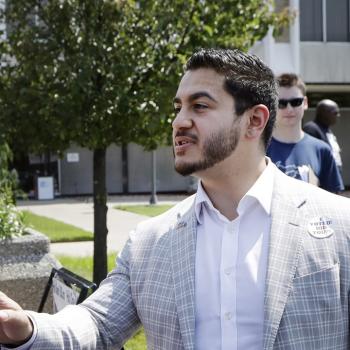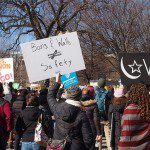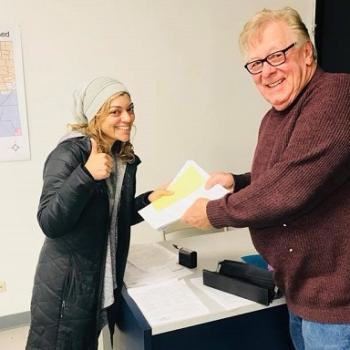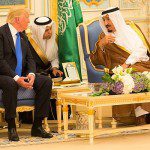 |
|
Not a rock god
|
Canadian musician Dawud Wharnsby-Ali has been credited with creating a new genre of Islamic music – the English-language nasheed – which is mostly a capella music with world and folk styles that is drawn from the Islamic tradition. Since 1996, he has released many albums of children’s music with themes involving nature, Islam, and social issues. Recently, Dawud has returned to his folk music background, picking up his guitar to sing songs including “Love Strong” and “Vacuous Waxing” with co-writer and long-time friend Bill Kocher. His new releases, complete with instruments, include “The Poets and The Prophet” as well as upcoming releases of “Out Seeing the Fields” and “Rising from the West.” Wharnsby spoke recently to altmuslim contributor Aisha Qidwae, eager to correct misconceptions people have his choice of music and his interaction and relationship with the Muslim and larger community.
![]() Many people associate you as creating this new genre of Islamic music – the English language nasheed – but the work you’ve done recently takes a different path from that. How were you inspired to do that? And what inspired you?
Many people associate you as creating this new genre of Islamic music – the English language nasheed – but the work you’ve done recently takes a different path from that. How were you inspired to do that? And what inspired you?
People take faith and knowledge and music and art and they always try to profit from it. You’ve got evangelicals, you got your rock and roll scene – whatever it is. It takes something powerful and beautiful, and twists it. And even though I was just involved in folk music, I saw that was happening. I was really struggling with my own ego and wanting to focus more on the music instead of being on stage. So that’s why I started doing English language nasheeds. I thought it was pretty safe ground because it’s a spiritual domain, it’s a musical domain, it’s a way of helping educate, especially children, so there’s no way this will become corrupted in any way.
But unfortunately, it was no intention on my part to start a new genre. You know, the nasheed is a great and ancient style of music. All I was doing was putting it English for myself and for other people in North America. But it somehow turned into this ugly genre, whereby you find that artists who are within the Muslim community, for example, are very sincere and wanting to provide some sort of expression to the community, but there are some scoundrels out there who are looking at it as a marketable thing.
![]() Were nasheeds an alternative to Western music for you?
Were nasheeds an alternative to Western music for you?
I’ve always listened to music. I enjoy artists from anyone from Alicia Keys to Prince. I mean these are artists I’ve always listened to even after embracing the Qur’an. But the nasheed was the universal stick I wanted to provide for the community – not as an alternative to mainstream music, just as another option to listen to and fill our ears with. So after doing several albums like that, I just felt like it was time for me to grow again and try some new things and go back to a different style of music, or try other styles of music that may reach other audiences.
![]() You’ve worked with Bill Kocher back in your teens, so after your quest and growth of faith, how was it working with him again?
You’ve worked with Bill Kocher back in your teens, so after your quest and growth of faith, how was it working with him again?
In those days, when we were 17, we wanted to be “rock gods.” Of course, we were both geeks and couldn’t play our instruments very well, so that was out of the question. And then when I embraced the Qur’an, I was like, well, I don’t know if it’s necessarily right for me to be a “rock god”, considering there’s already a Creator of the universe. We kind of separated and stopped playing music for a couple of years, and it was really nice to come back to it again. It rekindled a friendship in us that hopefully will last for decades, inshallah.
![]() Are you continuing to write nasheeds on the side? Or have you put it on hold?
Are you continuing to write nasheeds on the side? Or have you put it on hold?
Definitely, I’m working on an album on the side for children, but it’s just vocals and percussion. Whether or not you would call it a nasheed – I mean, I guess you could. Content-wise, some of it is drawn from Quranic wisdom and knowledge, but it’s a pretty simple album of drums and percussions. I’m not going to cut off any particular group of people who’ve been supporters up until now, but I do hope those people who I think would email me and say, “What are you doing? You’re crazy and we’re never going to listen to those albums again!” are no different than those people who used to roll steamrollers over Yusuf Islam’s (Cat Stevens) old music in the 70’s when he became Muslim.
![]() Do you ever feel that you might be appeasing different audiences, for example, in the music video of “Midnight“, where it seems like someone became Muslim and is trying to explain it to his significant other and it’s not taken that well?
Do you ever feel that you might be appeasing different audiences, for example, in the music video of “Midnight“, where it seems like someone became Muslim and is trying to explain it to his significant other and it’s not taken that well?
Two people who love each other – mother, daughter, father, daughter, husband, wife – they love each other, but there’s a disconnect, they can’t understand, and that really hurts… And I think that’s what the song is trying to talk more about and not necessarily conversion. It’s actually addressing that issue of conflict and resolution.
I didn’t initially want to put the hijab and Qur’an in there, but I was told that it was to air in a Muslim country, [and] there needed to be something that people needed to identify with. But if I do that, then in the very least, I want there to be no [resolution]. I want there to be no conclusion. So many people contacted me, and now we’re on YouTube and there’s debates [about] what happens in the video. I don’t get it. Well, think about it – I don’t know what happens either.
![]() Do you feel that people have used your music to propagate their own agenda of having alternative music that does not use specific instruments for religious reasons?
Do you feel that people have used your music to propagate their own agenda of having alternative music that does not use specific instruments for religious reasons?
My perception is that… it’s not honest of me to release an album with drums and vocals only, which gives the impression that I believe music to be haram, and then propagate that. My responsibility is to act with integrity. Allah talks in the Qur’an about the poets who wander around distractingly, saying one thing but doing the opposite.
For many years, I released albums with drums and vocals only, but on the weekends I would never listen to nasheeds – I would listen to Prince and play my guitar at home. So I would often feel like a hypocrite when I would go before audiences. And I think that’s why even this new album “Out Seeing the Fields” deals a lot with that, it’s honesty, it’s the idea that this is who I am – take me or leave me. And if you agree with me, hey come on board, we’re all together. And if you don’t, that’s cool too, you’re happy to find [that] there’s plenty of other people out there now. In the early days, there was just Zain (Bhikha), Yusuf (Islam) and I – now there’s oodles of nasheed artists.
Aisha Qidwae is a senior at Columbia College-Chicago majoring in print journalism, with aspirations to become a foreign correspondent. Usra Ghazi, a host on WLUW 88.7 FM, contributed to the questions in this interview.











